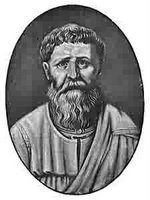Is God the Cause or Creator of Evil? (Part Two)
 Augustine, in so many words, called evil a privation. What Augustine meant by this was that evil was not a substance, like dirt, metal or wood. I cannot go into my back yard and dip into a bucket and grab a handful of evil. So the question then is what is it? And Augustine’s answer would be, evil is actually the absence of a thing.
Augustine, in so many words, called evil a privation. What Augustine meant by this was that evil was not a substance, like dirt, metal or wood. I cannot go into my back yard and dip into a bucket and grab a handful of evil. So the question then is what is it? And Augustine’s answer would be, evil is actually the absence of a thing.For instance, cold and darkness are privations. One cannot contain a jar full of "cold.". Likewise, darkness is not something you keep in a box (although it might be dark in a box if the all the lids are closed). These things, cold and darkness are the absence of hot and light. Evil, in an ontological sense is the same. It is the absence of a thing (i.e. the absence of goodness).
To declare that since God is the creator of everything, and evil is a part of everything, thus God created evil, is a belief which was held by the Manichees, and Augustine emphatically denied this belief. His counter argument would look something like this:
God created everything.
However, evil is not a thing (it is the absence of a thing).
Therefore, God did not create evil.
I think Augustine has as best as he could as a limited creature delineated the ontology of evil in a most proper and correct fashion. There is a strong sense of mystery in the issues surrounding evil, and the problem of evil (theodicy). To attribute that God, who is perfectly good in His essence and being, is the author or creator of evil, I believe, is to simply misunderstand not only the ontology of evil, but also the nature and essence of God.
[This post, of course, is not intended to respond to evil as it relates to human nature, or the ultimate issues of theodicy (if God is good why is there evil?) Rather, my aim was to answer the question (and I did so in a very brief fashion), Did God create or cause evil? The interesting thing about my previous post (part one), regarding the recent discussions I have had, came home to roost again tonight. Someone just this very evening asked me what my opinion was regarding this very question - I find it quite interesting that this question has continued to be brought up so often recently]


2 Comments:
Nicely done. Great answer, if not THE answer to such a difficult problem. Isn't it great to be able to hearken back to Sts. Augustine or Thomas Aquinas on these issues? I hardly know where Western Christianity would be without them.
Excellent points, Todd. I think Augustine's approach in this regard is genius. How can God create that which is against his will? Asked this way, it highlights the sheer potentiality of evil. That is, as an abstract concept, evil is potential: that which God does not will. This potential opposition to God can only be actualized by creatures.
This, however, highlights the point that Barth made in answering this same question in an Augustinian manner, though differing from Augustine with regard to evil's "existence." (I am no Barth expert, but am drawing from my reading of Barth, "Church Dogmatics: A Selection", edited by Helmut Gollwitzer, translated by G.W. Bromily [Harper Torchbooks, 1961]). If I make take the liberty of putting his point into the language of the present discourse: Evil (or das Nichtige, nothingness) is NOT nothing, i.e. does not exist. Nothingness exists, but only negatively.
Barth says it this way: "Nothingness has no existence and cannot be known except as the object of God's activity as always a holy activity.... God elects, and therefore rejects what He does not elect. God wills, and therefore opposes what He does not will. He says Yes, and therefore says No to that to // which He has not said Yes. He works according to His purpose, and in so doing rejects and dismisses all that gainsays it. Both of these activities, grounded in his election and decision, are necessary elements in His sovereign action." (139-40)
"It [nothingness], 'is' problematically because it is only on the left hand of God, under His No, the object of His jealousy, wrath and judgment. It 'is,' not as God and His creation are, but only in its own improper way, as inherent contradiction, as impossible possibility. Yet because it is on the left hand of God, it really 'is' in this paradoxical manner." (140)
So then, according to Barth, God DID create evil in a sense, but only indirectly. That is, in creating what he willed and electing what he desired, he necessarily rejected that which he did not will and did not desire. But that which God 'created' negatively and potentially, his creatures actualize.
As a footnote, with regard to our ongoing discussion about tradition, I think Barth's theologoumena here is a beautiful example of the dynamic process of appropriating and developing the tradition. Augustine is a revered father of the Church, but not infallible. (I hope my Catholic brethren will not begrudge me for making that observation, as many Reformed persons might when I observe that Calvin's advocacy of a doctrine is not sufficient proof of its truthfulness.) No matter who says it, there is always room for more to be said and for ideas to be revised.
Post a Comment
<< Home